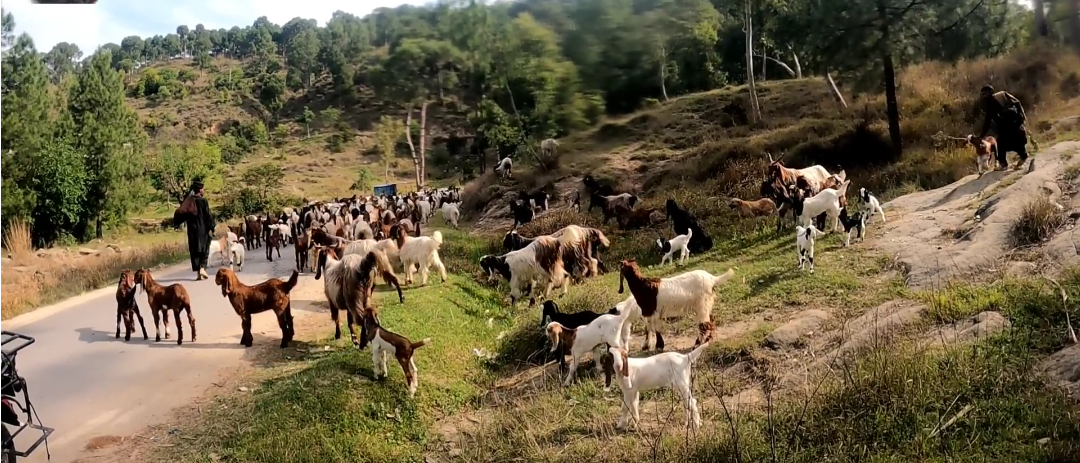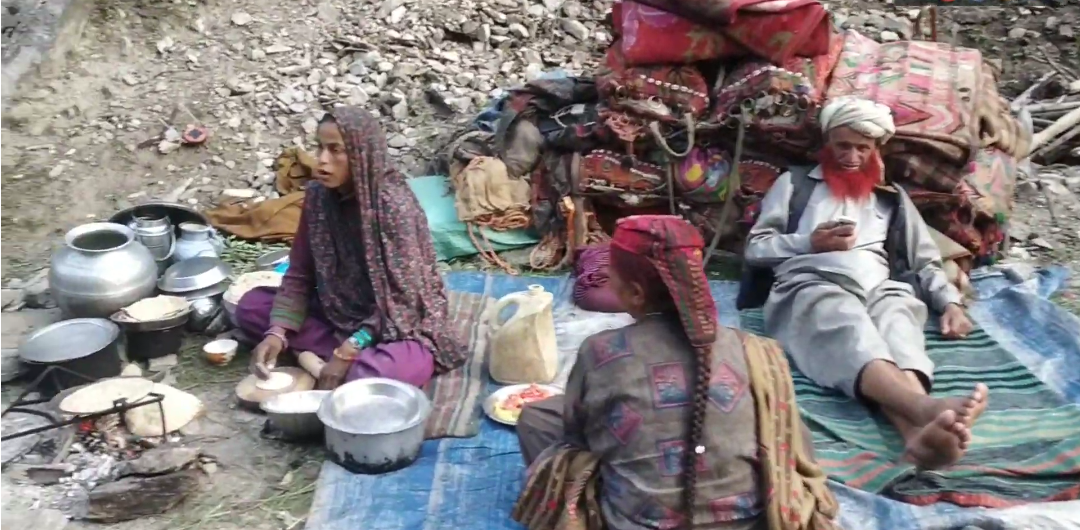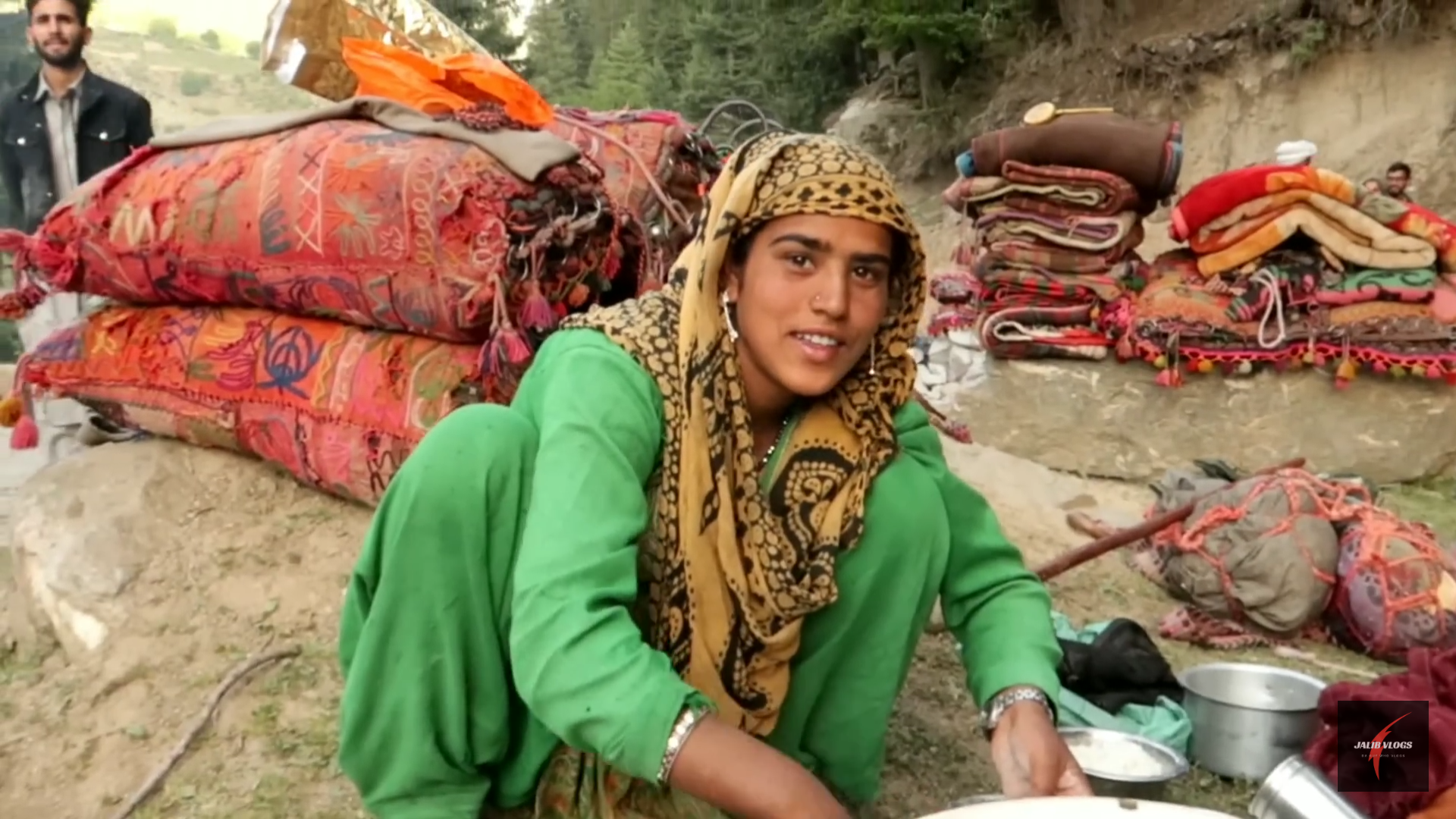Boiling water in a kettle on a hearth outside her tent, 38-year-old Shabbira, a woman from the Bakarwal community is expecting her fifth child any day.
Residing in a makeshift camp near the Salgaran area of Rawalpindi, she lives with her husband’s clan. Despite being in the final days of her pregnancy, she tends to household chores, prepares meals, herds animals and grazes for them, from dawn until dusk.
Belonging to a nomadic community, Shabbira gave birth to her four children while constantly relocating, and conceived babies without seeking medical guidance.
During my holiday excursion to Salgaran, which is situated near my university I had a fortuitous encounter with Shabbira. While exploring, my companions and I came across a group of Bakarwals camping. Captivated by the scene, I took the opportunity to engage in conversation with Shabbira, and inquire about their unique way of life.
Shabbira recounted the events of October 10, 2022, when she was expecting her fourth child and went into labour in a field. She described feeling faint, but fortunately her mother-in-law intervened and revived her.
“The labour pain was horrific from my previous three deliveries, I thought I would die. In urgency, my mother-in-law directed my husband to fetch someone from a nearby village where we camped. Some women came to see me and they asked a local midwife for help,” she recalled.

Seeing the complexity of the situation, the midwife advised a referral to a larger hospital. She was then rescued by local villagers and transported in a 4x4 local jeep to a nearby basic health facility, where a female medical technician provided initial treatment and arranged her to be transferred to a more advanced hospital.
She shared how difficult it was because she had no identity documents so the doctors were initially reluctant to take her case, as a CNIC is required for treatment.
Shabbira became unconscious due to the severity of her labour pains. With her condition deteriorating, the medical superintendent, motivated by humanitarian concerns authorized a risky surgical procedure despite the potential risks for the medical team if she did not survive it. Fortunately, the operation was successful, leading to the birth of her baby. Sadly the child did not survive.
She laments losing her baby boy in the last delivery, while her earlier births were girls who are not considered much better than males in their community. Worried about her previous experience, she fears it might affect her chances of having more children and fulfilling her husband’s desire for male heirs, a concern echoed by her mother-in-law.
She bears severe pain but keeps it from her husband, feeling it inappropriate to share with him. Instead, she confides in her mother-in-law, hoping for a miracle and praying for a natural birth, desiring a natural delivery.
Speaking to me, Shah Dad, who was heading their caravan, stated that as they are not given the rights of citizens by the State of Jammu and Kashmir and Pakistan, they face such issues without these documents and are unable to benefit from access to health, education, employment, ownership of property, getting SIM cards and having access to basic rights and privileges that a citizen enjoys by recognition of their existence.
“Most childbirths occur on our way and complications prompt transport to local midwives nearby in the area where we camp. In most cases, women and babies die and they are buried where they die,” he said.

When asked about their lack of citizenship, he explained that they do not possess the basic documents required by the National Database and Registration Authority (Nadra). Consequently, they are required to undergo inquiries for clearance, but due to the arduous process and issuance delays, they are unable to obtain any citizenship documentation.
Munir Ahmed, an academic serving as an associate professor in the Higher Education Department of Khyber-Pakhtunkhwa, has extensively researched the Bakarwal community. When discussing the history of the Bakarwals, he highlighted that anthropological and ethnographic analyses characterised them as nomadic Gujjars who have upheld their forefathers’ culture by maintaining a transient lifestyle.
He explained that the term Bakarwal is derived from the Gojri language, where “bakar” means goat or sheep, and “wal” refers to someone who takes care of something. Therefore, Bakarwal translates to high-altitude goatherd or shepherd.
Looking back on his upbringing, Ahmed reminisced about his admiration for the Bakarwal way of life. He mentioned how during his childhood, he frequently witnessed groups of goats and sheep temporarily settling in the fields while the Bakarwals travelled to Deosai, Neelam and Kaghan Valleys in the summer season. During winter, they sought refuge in the more hospitable climates of Khyber Pakhtunkhwa and the Potohar region of Punjab.
“They use specially trained dogs, alongside horses and camels, for caravan protection and transportation. These dogs, known are known for centuries for their role in safeguarding caravans, constitute an essential part of Bakarwal inventory,” he said.
According to Ahmed, the Bakarwals’ everyday diet comprises milk, butter, cheese, lassi, wheat and maize bread. Their economic significance is noteworthy, particularly in the trade of goats and sheep.
He indicated that, according to reports from the Department of Environmental Science at the University of Peshawar, the Bakarwals from Hazara division are responsible for adding billions of rupees into Pakistan’s national income every year.
He said the Bakarwals provide environmental and economic services that are indispensable.
“They not only supply wool, milk, leather and meat but they also provide natural fertilisers to the fields,” he said.

He explained that many plants have seeds that are transported from one place to another through their livestock. If the number of certain plants increases, they can become hazardous for agriculture and humans, so their population is kept under control. All these services are provided by the Bakarwals for free, without asking for electricity, water, or roads in return. They do not even spend money on petrol or gas.
Ahmed laments that due to change in climate pattern and urbanisation, the Bakarwals are facing hardships as they lack lands for their animals for grazing. He said the major issue for them is lack of citizenship documents for them.
Sarmad Faraz, an advocate at the High Court in Islamabad, emphasised the significance of Section 4 of the Birth Right Citizenship Act of 1951, which unequivocally states that everyone born within the territorial confines of Pakistan is inherently entitled to be bestowed with Pakistani citizenship. However, he observed that despite the clarity of this legal provision, its effective enforcement remains elusive.
He stressed the presence of a robust legal framework alongside Pakistan’s international obligations, which is imperative for adherence and compliance. He referenced various international documents such as the Universal Declaration of Human Rights 1948, specifically Article 15, as well as Articles 7 and 8 of the Convention on the Rights of the Child 1989, Article 9 of the Convention on the Elimination of All Forms of Discrimination Against Women (CEDAW) 1979 and Article 33 of the UN Declaration on the Rights of Indigenous Peoples (UNDRIP) 2007. Despite Pakistan being a signatory to these agreements, Faraz pointed out that the Bakarwals ethnic group still faces challenges in obtaining citizenship due to bureaucratic obstacles in acquiring CNICs.
According to Faraz, possessing fundamental citizenship documents is crucial for accessing essential services such as healthcare, education, employment and property ownership yet marginalised communities encounter obstacles in these domains due to their inability to furnish adequate legal proof of identity.
“Today, as higher judiciary directed police inspector generals to curb instances of officials harassing citizens under the pretext of Eid checks for bribes, it is disheartening to witness the ongoing vulnerability experienced by citizens who possess all requisite citizenship rights and proper identification. Despite repeated directives from the judiciary and law enforcement leadership, instances of police harassment persist. Imagine the struggle for the Bakarwals and other nomadic communities without any documents,” Faraz pointed out.
He said, when the police receive complaints against Bakarwals for minor offenses, they face a prolonged procedure. This is because without identity cards, they lack people to vouch for their bail.
Faraz noted that nomads are often viewed through a security lens rather than considering their human rights issues and the challenges they face. He proposed that legislation should be enacted in parliament, accompanied by sessions aimed at assisting them in obtaining citizenship. Without such measures, he warned, their situation may mirror that of unregistered Afghan refugees.
When approached for comment, a NADRA spokesperson was unavailable, but a senior official from NADRA Islamabad speaking on the condition of anonymity, disclosed that numerous communities in Pakistan lack basic citizenship documents.
“Despite NADRA’s repeated attempts to register them and the relaxation of several conditions in special cases, certain communities, such as the Bakarwals, remain reluctant to obtain citizenship documents,” he asserted.
He explained that this reluctance stems from their lack of literacy and awareness regarding the benefits of possessing a CNIC.
“Despite having limited freedoms enshrined in law, efforts are ongoing within relevant departments and standing committees of the Senate, provincial assemblies and National Assembly to address their situation,” he said.
He emphasised the importance of legislative action, noting that their registration is essential, particularly considering their residency within the state.
Amna Sardar, a lawmaker from the Khyber Pakhtunkhwa Assembly, asserted that the marginalised segments within the fabric of Pakistani society face the glaring absence of official identity documentation, a fundamental prerequisite for the assertion of citizenship rights. Consequently, their existence remains unrecorded within the annals of NADRA, effectively precluding them from accessing the array of entitlements conferred upon citizens.
Shining a spotlight on this urgent matter, Sardar suggested a proactive approach to address these obstacles hindering Bakarwals from obtaining proper citizenship. She said, it is the vital need for collective action to directly confront the systemic denial of citizenship rights experienced by this vulnerable community. She emphasised that such deprivation not only strips them of crucial societal protections but also impedes their access to basic necessities usually facilitated through official citizenship documentation.
She recommended a comprehensive approach, where community-led efforts are crucial in empowering the Bakarwals. Many of them facing illiteracy have little understanding of the importance of getting state citizenship. She is particularly concerned about women, who often cannot get CNICs due to societal norms. Stressing the importance of laws, she highlighted the need for grassroots movements to bring about lasting change.
Recounting past legislative endeavours, she referenced the formation of a specialised task force within the provincial assembly of Khyber Pakhtunkhwa during its preceding tenure.
She said, that a working group was tasked with drafting comprehensive legislation tailored to facilitate the acquisition of CNICs for nomadic communities, including the Bakarwals, this collaborative effort between the opposition and treasury lawmakers signifies a bipartisan commitment to addressing the longstanding grievances of marginalised itinerant workers.
Looking ahead, she expressed optimism regarding the imminent passage of requisite legislation, envisaging a future wherein NADRA conducts localised door-to-door registration drives and leverages mobile connectivity to streamline the cumbersome CNIC application process for marginalised communities.
As dawn breaks on the horizon, Shabbira’s courage inspires us to stand in solidarity with those who face adversity. May her story propel us towards a future of dignity and equality for all.
Ayesha Fiaz is a research scholar and freelance journalist
All facts and information are the sole responsibility of the author
